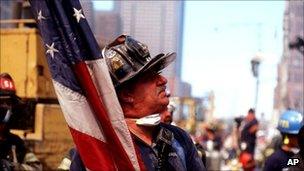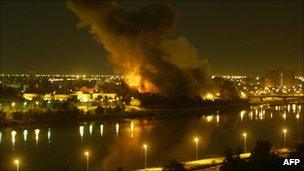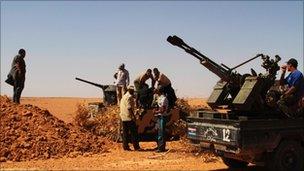9/11 defined the past decade for the US and Europe
- Published
- comments

In the days following the 9/11 attacks every rescue worker became a hero
9/11 shaped our history - both American and European. Few parts of the globe have escaped its shadow. It was the defining moment of the past decade. We are still living with its legacy. American certainty and optimism have been dented.
I went to Ground Zero after the attacks and covered the wars that followed. In 2008 I followed the Obama campaign all the way to his moment on victory in Grant Park in Chicago. A history moment that in no small way had its roots in 9/11.
As the anniversary approaches, I have gone back to my notes and writings and reflected on what 9/11 means now for both America and Europe.
At Ground Zero
The moment I stood beside One Liberty Plaza in the heart of Ground Zero:
"A towering smoking waste tip of twisted girders and concrete, taller than a six-storey building. There were groups of men working on it, like scavengers, small figures, amidst the immensity of the rubble. They used drills, spades, mechanical diggers and hands. And everywhere the throb of generators. Gusts of wind caught the smoke. It was in our eyes and in our throats... I asked one of the fire-fighters: 'What does this mean to you?' He did not pause or hesitate. 'Freedom,' he said, 'freedom for our country'. He did not say it was about rescuing colleagues or saving lives, it went beyond that, to something primal and fundamental. And all of them were like this, eyes glistening with patriotism."
Crowds lined the West Side highway. In those days every rescue worker became a hero:
"The image of the fire-fighters raising a flag above the rubble became iconic. It drew on the past - the marines raising the flag at Iwo Jima - and so became a reaffirmation of who Americans believed they were. People everywhere wanted to sign up. In those days and weeks it was easy to offer a life, to lay it down. Flags flew from aerials, were worn in lapels; football fields were painted red, white and blue. It was inescapable, this great stirring, this enormous patriotic outpouring, and I wondered then what would be done with it, and where it would lead."
The day I was at Ground Zero was the day President Bush came. He stood on the rubble and said "the people who did this will be hearing from us soon". The rescue workers chanted "U-S-A, U-S-A." In that moment a deep wound and patriotism gave the American President great freedom to act. It is often forgotten that in those days the world stood with America.
Everywhere were humbling examples of sacrifice:
"I went to the funeral of John Fischer, a fire-fighter who was on the 35th floor of one of the towers when the order came through to evacuate the building. He noticed two of his men had continued up. He could not reach them on the radio and so he walked up to tell them and was never seen again. Before heading to the World Trade Centre he had left a message for his wife Jean: 'I called you back but got no answer.' As we watched she delivered her final tribute: 'Everyone calls you a hero... I always knew it.'"
Dangerously bold ambition
Some time later I went to the West Point military academy where President Bush enunciated his new doctrine of pre-emptive intervention. Emboldened by a wounded, patriotic people behind him he saw an "axis of evil" of unstable dictators that needed to be taken out before they turned weapons of mass destruction on others. It was a dangerously bold ambition but this was not a time for doubters in America.
The Europeans with their old-world caution were ridiculed. I remember in New York a paper carrying a picture of the Security Council. The faces of the French and German ambassadors had been replaced by those of weasels and the UN Security Council was dubbed the "Council of weasels".
America believed it could re-shape the world in its own image, that its offer of freedom would be seized on gratefully.
I covered both of George Bush's election campaigns. One of his mantras was that free people do not export violence and terrorism. So America's love of freedom was to be exported and the first place was Iraq.
Shock and awe
I went for a week of training in Quantico and was embedded with the American Third Infantry. Waiting in the desert for war to begin we were told we would be attacked with chemical weapons. Certainly the colonels expected weapons of mass destruction to be found.

The war brought years of chaos to Iraq
"Then the war started. The terrible beauty of shock and awe. Salvo after salvo of rockets launched into the night sky trailing arc of brilliant white light. There were flashes, orange flashes as the artillery fired. And the sound, the rumble from the multiple rocket launchers and the sharper crack from the guns of the Paladins."
Occasionally the unit I was attached to was diverted to search for chemical weapons but after a week we were told we could remove our chemical suits.
But I noticed then how difficult it was for a western force to invade an Arab country and deliver freedom. I rode into the Iraqi city of Karbala on a Bradley:
"To most of the people we were liberators. Karbala had felt the lash of Saddam's cruelty. Many waved, some jerked their thumbs up, others had their hands spread in welcome… but the American soldiers did not want the people close. They were liberated but not trusted. The people also held back. They were restrained, guarded, a half-smiling crowd. No outpouring. They were not like other liberations when soldiers and people hugged sure of each other…"
And then onto Baghdad where chaos and poor planning condemned Iraq to disorder and years of violence.
"This was liberation day, bright, shining - but incomplete… cars followed our victory parade but many were weighed down with rugs, boxes and electrical goods on roof racks. They were looters… the unit felt deflated, denied the buzz of victory. The looters took care of that. Some of the soldiers felt the Iraqis had shown no gratitude.
"The Americans had taken the capital but, within hours, had lost control of the streets. They had not brought not freedom but insecurity. The soldiers had fought but they had invested little in the campaign and now wanted to head home."
Few 'missions accomplished'
Iraq bled America. Donald Rumsfeld had opted for invasion-lite. There were simply not the troops to restore order and essential services. The country had not been understood, its factions, its religious differences. Saddam's army was sacked and the ranks of an insurgency filled.

Western powers tried to put the lessons of 9/11 into effect in Libya
To much of the world the invasion was a disaster. Intelligence dossiers were seen as flawed. People in Europe and America felt lied to. The support for military intervention drained away.
Thousands of American and Iraqi lives were lost.
No part of American society is accorded the respect given to the military. But countless families have questioned what the sacrifices were for.
For this generation there has been no liberation day. 9/11 has ushered in a period of endless war where America's awesome arsenal counts for little. There are few "missions accomplished". The killing of Osama Bin Laden was a rare victory.
The failure of Iraq made possible the election of Barack Obama. Bush and his ideas were a spent force. Obama was loved by the Europeans. I stood in the Tiergarten in Berlin as a quarter of a million stood to listen to a man who was not even a candidate. They wanted a different, less aggressive, America. They hankered after the idealism of a JFK and in Obama they felt they had found it.
Iraq and Afghanistan have drained the United States. The long campaigns have emptied the coffers. The financial crisis has some of its roots in the attack on the World Trade Centre.
Unready for leadership
America is still a patriotic country. But under President Obama it no longer presents itself as the indispensable power. Over Libya the message to the Europeans was that they had to take the lead in their own back-yard. President Sarkozy and Prime Minister David Cameron assumed command of the operation but, in truth, the Europeans are unready for leadership.
During the Arab Spring the Western powers have tried to put into effect the lessons of 9/11. In Libya there were only a handful of Western boots on the ground. It was important that the overthrowing of Gaddafi was 'made in Libya' and not dreamt up in some Washington think-tank.
President Obama has sought to marry American foreign policy with its own values. Dictators who offer stability may not in the future be regarded as reliable allies.
A weaker America has enabled China to emerge as a world power. In Europe there is still a strong desire for American leadership and dynamism. American values and its culture still command an enormous pull. Many Europeans want an America that is active in the world.
But ultimately 9/11 was a battle in a wider struggle over ideas and values. The attacks which killed people from all backgrounds and faiths were somehow justified as a blow against the Great Satan. The real fight, however, is not in the desert reaches of Somalia or Yemen but for the minds of a young generation in the Middle East that in their own way are searching for freedom, jobs and, above all, respect.